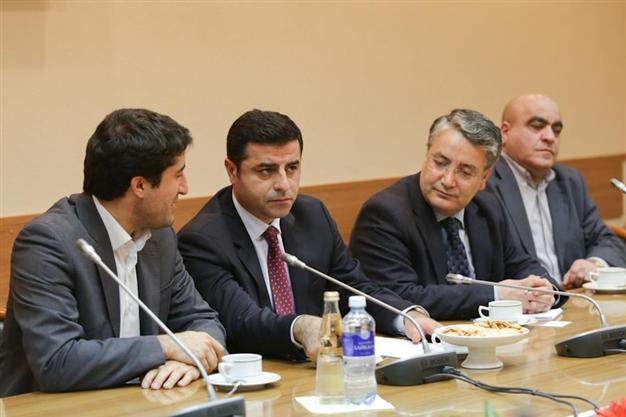HDP wants to see greater Russian role on Kurdish issue
MOSCOW

Peoples’ Democratic Party (HDP) co-leader Selahattin Demirtaş is in a trip to Moscow.
Moscow needs to become more involved in the Kurdish issue, Selahattin Demirtaş, the co-leader of the Peoples’ Democratic Party (HDP), has said during a five-day visit to the Russian capital.Russia does not generally contact Kurds directly, but prefers doing this via Turkey, Demirtaş told dailies Sputnik and Kommersant, Cihan news agency reported.
“Such an approach by Russia should be left in the past. The approach of the Turkish officials have already changed,” he was quoted as saying, as he highlighted Turkey’s 20-month efforts to find a peaceful solution to the Kurdish bid.
Demirtaş said the issue would be discussed in his contacts with Russian Foreign Ministry officials.
Demirtas was pleased that Kurdish proposals regarding the settlement of “a number of Middle East issues,” had been met with interest in Moscow and that Russia had expressed a will to broaden communication, Sputnik said. “This is especially important today because it should be taken into account that unfortunately, Kurdish diplomatic initiatives and meetings so far have not been held on such a high level,” it quoted the politician as saying.
“Kurdish attempts to establish fair and equality-based relations with other nations, [relations that would be] far from being nationalist or racist, are not receiving due understanding from the international community,” he reportedly said.
The Turkish government categorically closed the door on the involvement of any third party in the peace process in November, which it labels as its brainchild.
“This process is a local process,” Deputy Prime Minister Yalçın Akdoğan said Nov. 16, speaking of the process aimed at ending the three-decade-long conflict between the outlawed Kurdistan Workers’ Party (PKK) and Turkish security forces.
“It is a process which Turkey implemented with its own will. We don’t believe that the inclusion of a different country, mechanism, system, organization or structure would be right. Turkey is advancing this process with its own opportunities and capabilities,” Akdoğan said, while responding to various questions in a meeting with the state-run Anadolu Agency’s “Editor Desk.”
Akdoğan’s strongly worded remarks were an apparent response to the PKK’s demand for an international mediator, possibly the United States, to help get peace talks with Turkey back on track and avert an escalation of their insurgency.
“We have now reached the point where there has to be movement. That is why we are suggesting a third power observe this process. This could be the United States. It could also be an international delegation. We need a go-between, we need observers. We would also accept the Americans. From our view, it is moving in this direction,” Cemil Bayık, a founding member and leading figure of the PKK, told Austrian newspaper Der Standard in early November.
The U.S., like its NATO ally Turkey and the European Union, classifies the PKK as a terrorist organization.
Furthermore, Akdoğan also argued that the involvement of a third country would complicate the process.
Borders issue
When asked about whether his party was planning to bring the question of borders to the agenda, Demirtaş said this was not the time to discuss such issues seriously.
“But the situation is changing rapidly in the region,” he was quoted as saying, while noting that borders would soon lose their meaning.
Demirtas noted that “Kurds do not necessarily have positions that are similar to those of the countries they live in.” He added that Kurds understand the importance of the development of Russian-Turkish relations and believe that the development of Russian-Kurdish relations does not contradict this aim.
Kurds are a Middle Eastern ethnic group with a population of some 30 million to 35 million, according to the rough estimates by the CIA, living mainly in Turkey, Iran, Iraq and Syria. The Kurdish population is largely Sunni Muslim with their own language and traditions.
















